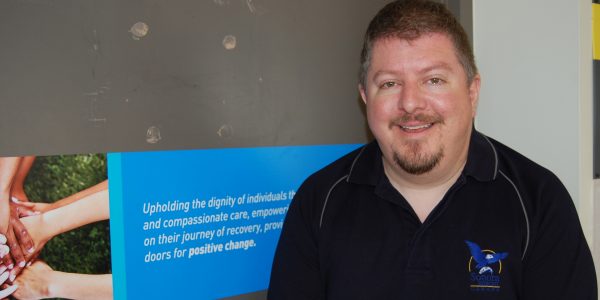PFCC is personal for Mike Tibbles
Mike Tibbles bristles at the label mental health consumer. “A consumer is someone who takes, and I want to do much more than that.”
And he is.
Tibbles participates as an advisor to the Richmond Mental Health Team’s Person and Family Centred Care (PFCC) Initiative. Since work began on the initiative last year, it has championed transformational change by encouraging the “letting go” of familiar ways of working, and embracing new ideas and opportunities. In fact, Tibbles stood with the clinical team recently when they received an Award of Merit in the category of Teamwork and Collaboration in the 2016 VCH People First Awards.
It was a place Tibbles didn’t see himself when he was first admitted to Richmond Hospital five years ago. Then, Tibbles spent four days in one of the windowless, concrete psychiatric observation rooms, located in the back of the emergency department.
“It was like being in solitary,” he said. “What made it bearable was that one staff in particular got to know me, kept my cell phone charged for me so I could play games, and left my door open because I wasn’t a flight risk…it was a bad time in my life, but that nurse made my stay as pleasant as possible and treated me like a human.”
Participation for the good of others
The positive gains he has made with the help of the clinical and community supports in Richmond led him to jump at the opportunity to take part in the PFCC initiative as a patient representative when he was invited.
Since joining, Tibbles has had input into the design of the new Richmond Mental Health Team offices. He’s also participated in a number of selection panels for employees at Richmond Mental Health and Substance Use (MHSU). It’s a place where his personal healthcare experiences and professional training intersect for the benefit of patient care.
“I was pleasantly surprised to be treated like a colleague instead of as a person with a mental illness, and it was clear that my past HR experience was valued and appreciated,” he said. “These panels have significantly aided in my recovery, allowing me to participate in real world business activities after many years living solely in the therapeutic world.”
But the small things matter, too
Tibbles’ perspective, though, doesn’t always focus on making major systematic changes. Sometimes it’s the small changes or gestures that can make a positive difference in the care of mental health patients.
For instance, it was Tibbles who drew attention to Psychiatric Emergency Unit (PEU) staff that the deck of cards was incomplete and some of the games were missing pieces. “When you’ve got nothing to do all day, it’s a big thing when you can’t even play solitaire because cards are missing from the deck,” he says. “This is something that only a former patient would likely notice.”
In 2014, Richmond MHSU participated in a site assessment by the Institute of Patient & Family Centered Care (IPFCC). Funded by the Richmond Hospital Foundation, the assessment reviewed current services and provided recommendations for how to make them more person and family centered, including the premise former client and families have a critical role to play in supporting affected people and that these individuals should be viewed as partners in care.
Although Tibbles’ tenure on the committee is only three months old, he hopes that his work as an advisor continues. “It means that I’m not just taking, but also giving back.”

